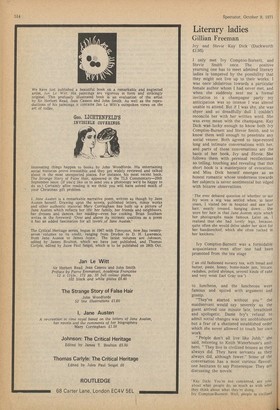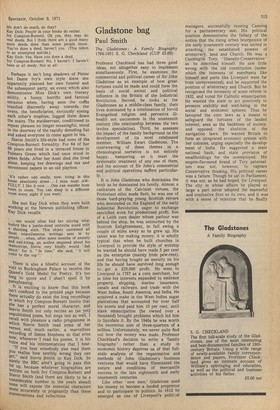Literary ladies
Gillian Freeman
Ivy and Stevie Kay Dick (Duckworth £1.95) I only met Ivy Compton-Burnett, and Stevie Smith once. The positive yearning one has to meet admired literary ladies is tempered by the possibility that they might not live up to their works. I was once idolatrous towards a particular female author whom I had never met, and when she suddenly sent me a formal invitation to a champagne party my anticipation was so intense I was almost unable to attend. But if I was shy, she was shyer and so dreadfully dull I couldn't reconcile her with her written word. She was even mean with the champagne. Kay Dick was lucky enough to know both Ivy Compton-Burnett and Stevie Smith, and to know them well enough to penetrate any social veneer. Both agreed to tape-record long and intimate conversations with her, and parts of these conversations are the basis of her book, Ivy and Stevie. She follows them with personal recollections so telling, touching and revealing that this short book is a masterpiece of evocation, and Miss Dick herself emerges as an honest romantic whose tenderness towards her subjects is never sentimental but edged with bizarre observations.
' The ever debated question of whether or not Ivy wore a wig was settled when, in later Years, I visited her in hospital and saw her hair, neatly tressed, hanging down ... She wore her hair in that Jane Austen style which her photographs made famous. Later on, I realised that she had lovely legs, because, quite often she would delve under her skirt for her handkerchief, which she often tucked in her knickers.'
Ivy Compton-Burnett was a formidable acquaintance even after one had been promoted from the tea stage (' an old fashioned nursery tea, with bread and butter, paste, honey, home-made jam, lettuce, radishes, potted shrimps, several kinds of cake and very weak Earl Gray tea ') to luncheon, and the luncheons were famous and spiced with argument and gossip.
"They've started without you " the maidservant would say severely as the guest arrived one minute late, breathless and apologetic. Dame Ivy's refusal to admit social changes was not snobbishness but a fear of a shattered established order which she never allowed to touch her own workp.eop People don't all live like Jubb," she said, referring to Keith Waterhouse's antihero, "They live in civilized houses as they always did, They have servants as they always did, although fewer," Some of the conversation has a most curious flavour, one hesitates to say Pinteresque. They are discussing the novels: 'Kay Dick: You're not concerned, are you, about what people do, so much as with what they think about what they're doing.
Ivy Compton-Burnett: Well, people in civilised life don't do much, do they?
Kay Dick: People in your books do rather. Ivy Compton-Burnett: Oh yes, they may do real deeds. But I think there are a good many more deeds done than some people know. You've done a deed, haven't you (This refers to an attempted suicide.) Kay Dick: Yes. Have you done a deed.
Ivy Compton-Burnett: No, I haven't. I haven't been at all deedy. Not at all.'
Perhaps it isn't long shadows of Pinter but Dame Ivy's own style since she apparently planned her own funeral and the subsequent party, an event which also demonstrates Miss Dick's own literary ability, a funny, horrific and farcical occasion when, having seen the coffin trundled discreetly away towards the ovens, the beneficiaries, enviously eyeing each other's trophies, lugged them down the stairs. The maidservant, conditioned to repeat phrases no longer meaningful, stood in the doorway of the rapidly denuding flat and asked everyone to come again to tea.
Stevie Smith's life-style had none of the Compton-Burnett formality. For 64 of her 68 years she lived in a terraced house in Palmers Green which had once stood in green fields. After her Aunt died she lived alone, keeping her drawings and tax and investment papers in an old playbox.
'It's rather odd really, now, living in this house absolutely alone ... I miss Aunt AWFULLY. I like it now. ... One can wander from room to room. You can sleep in a different room every night if you want.'
She met Kay Dick when they were both working at the Newnes publishing offices }(ay Dick recalls: • • . one would often find her stirring what looked like a jumbo-sized umbrella stand with a shooting stick. This object contained all those miscellaneous writings sent in by People ... when, after some months of anxiety and nail-biting, an author enquired about his manuscript, Stevie very kindly would 'fish about ' for it. "In time," she said, "it will come to the top There is also a blissful account of the visit to Buckingham Palace to receive the Queen's Gold Medal for Poetry. It's too long to quote and I shan't spoil it by Paraphrasing,
. is exciting to know that this book t confined to the printed page because there actually do exist the long recordings In which Ivy Compton-Burnett insists that she has a perfect moral character, and Stevie Smith not only recites an (as yet) unpublished poem, but sings one as well. I i recall with pleasure a radio programme n Which Stevie Smith read some of her verses, and, much earlier, a marvellous recording of James Stephens so that even now, whenever I read his poems, it is his voice and his interpretations that I hear.
If you hear somebody else read them You realise how terribly wrong they can get," said Stevie Smith to Kay Dick. So surely the BBC aren't going to pass this lot, up, because whatever biographies are written on both Ivy Compton-Burnett and Stevie Smith (and there are likely to be a considerable number in the years ahead) none will expose the essential characters !bore accurately or poignantly than these conversations and reflections.











































 Previous page
Previous page